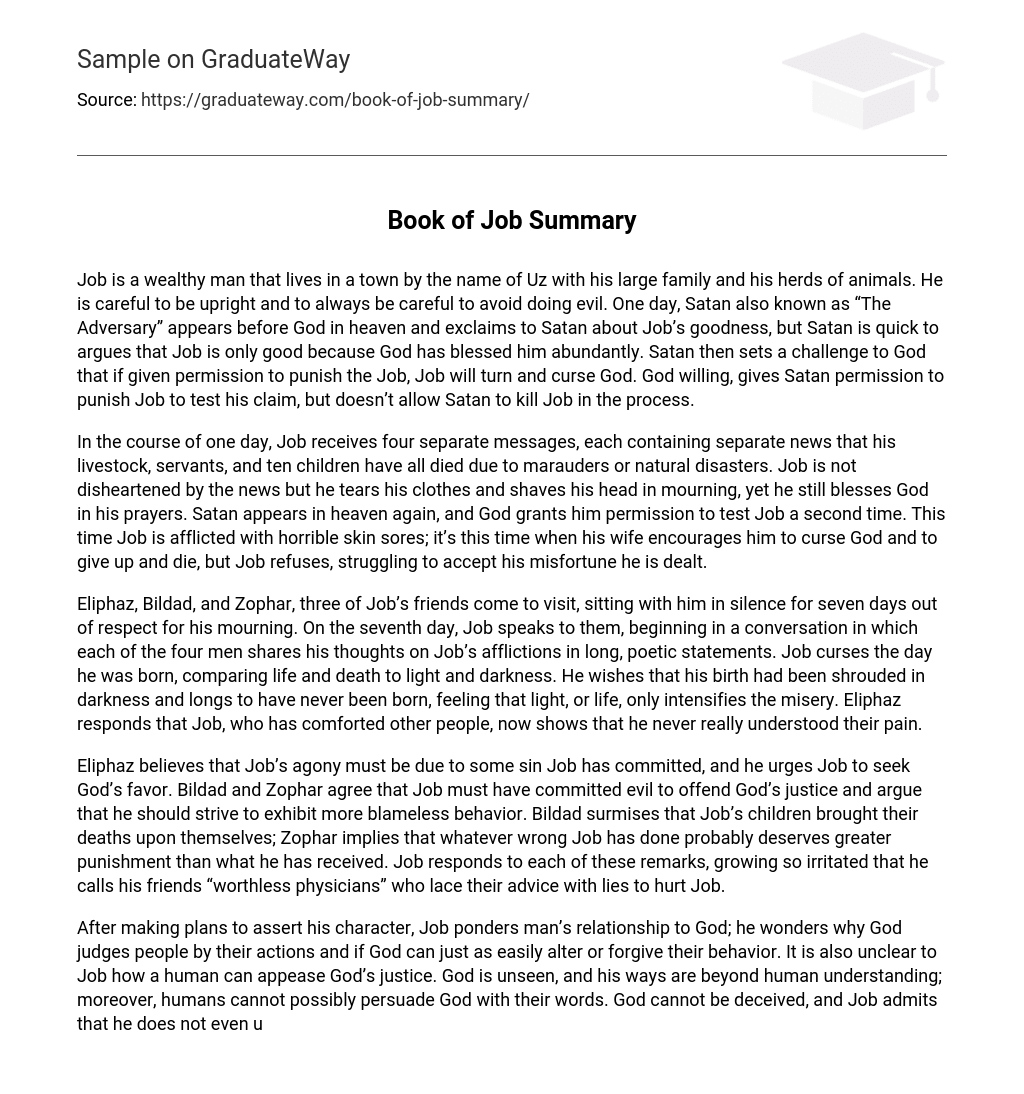Job, a wealthy man residing in the town of Uz, has a large family and numerous herds. He is committed to uprightness and avoiding evil. One day, Satan, also known as “The Adversary,” approaches God in heaven and acknowledges Job’s goodness. However, Satan quickly argues that Job is only virtuous because God has blessed him abundantly. Satan then proposes a challenge to God, suggesting that if he is allowed to punish Job, Job will ultimately curse God. God allows Satan to test this claim by punishing Job but prohibited Satan from taking his life.
Throughout one day, Job receives four separate messages. Each message brings news of the deaths of his livestock, servants, and ten children due to marauders or natural disasters. Despite the devastating news, Job remains resolute and continues to bless God in his prayers. Satan returns to heaven and is given permission by God to test Job once again. This time, Job is plagued with painful skin sores. Job’s wife urges him to curse God and give up on life, but Job refuses. He struggles to come to terms with the misfortune he has been dealt.
Three of Job’s friends, Eliphaz, Bildad, and Zophar, visit him and sit with him in silence for seven days to show respect for his mourning. On the seventh day, Job begins a conversation with them, where all four men express their thoughts on Job’s sufferings in long, poetic speeches. Job curses the day of his birth and compares life and death to light and darkness. He wishes that his birth had been concealed in darkness and longs to never have existed because he believes that light, or life, only amplifies the agony. Eliphaz rebuts that Job, who has consoled others, now reveals that he never truly comprehended their suffering.
Eliphaz, Bildad, and Zophar all believe that the cause of Job’s agony is his own sin. Eliphaz urges Job to seek God’s favor, while Bildad and Zophar argue that Job should strive to exhibit more blameless behavior. Bildad suggests that Job’s children brought their own deaths upon themselves, and Zophar implies that whatever wrong Job has done deserves greater punishment. In response, Job becomes increasingly irritated and describes his friends as “worthless physicians” who provide him with deceitful advice intended to harm him.
After contemplating his character, Job reflects on mankind’s relationship with God, questioning the fairness of God’s judgment based on actions and pondering the possibility of God’s ability to modify or forgive behavior. Job is perplexed by how humans can satisfy God’s sense of justice, considering that God is unseen and beyond human comprehension. Furthermore, Job acknowledges that words alone cannot convince God, as He cannot be deceived. Job confesses his own lack of understanding, making him unable to effectively argue his case before God. Desiring a mediator between himself and God, Job expresses a wish for either someone to bridge the gap or for God to send him to Sheol, the realm of the deceased.
Job’s friends are upset because he rejects their wisdom and they believe that his questions lack fear of God. They use numerous analogies to emphasize their continuous argument that nothing good comes from his wickedness. Despite these criticisms, Job remains confident and asserts that even if he has committed evil, it is his own personal issue. Job holds the belief that there is a “witness” or a “Redeemer” in heaven who will testify to his innocence. However, over time, this begins to take a toll on Job and proves too overwhelming for him to handle. Consequently, he becomes sarcastic, impatient, and fearful.
In this passage, Job expresses his frustration with God’s apparent acceptance of wicked people’s prosperity while he and other innocent individuals suffer. Job desires to confront and complain to God directly, but he is unable to physically locate Him. Additionally, Job believes that wisdom is something humans are unable to comprehend fully, yet he resolves to persist in his pursuit of wisdom by maintaining a righteous fear of God and avoiding evil. Unexpectedly, Elihu enters the conversation without provocation from Job. Elihu suggests that Job has focused too much on defending himself rather than honoring God. Elihu elaborates on how God communicates with humans through visions and physical pain.
According to Elihu, physical suffering gives someone the chance to recognize God’s love and forgiveness once they recover from their illness, acknowledging that God has saved them from certain death. Elihu also believes that Job must be guilty of wrongdoing in order to be experiencing such suffering, and he perceives Job’s constant talking as an act of defiance against God. Eventually, God interrupts from a whirlwind, urging Job to be courageous and answer his inquiries. These questions, posed by God, are intended to demonstrate Job’s limited knowledge of creation and the immense power possessed solely by God.
God provides a detailed description of his creation in which he highlights the creation of two magnificent creatures, the Behemoth (a large beast) and the Leviathan (a Sea Monster). Job is in awe of God’s power and acknowledges his limited understanding. This pleases God. However, God is unhappy with Eliphaz, Bildad, and Zophar for offering unsatisfactory advice. Job intervenes and God forgives them. Job is then blessed with restored health, double the wealth he had before, new children, and an incredibly long life.





